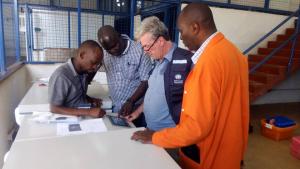Uganda Prepares to Vaccinate against Ebola in Case the Virus Strikes the Country
Kampala, 20th September 2018: As Ebola Virus Disease (EVD) preparedness activities intensify in Uganda, the Ministry of Health with support from the World Health Organization (WHO) is making arrangements to vaccinate frontline health workers and high-risk populations should need arise.
In case Uganda gets a case of EVD, a strategy known as ring vaccination will be implemented. Under this strategy, health workers will define several layers of contacts also known as contacts, contact of contacts and vaccinate them. These are people most likely to be infected with the virus and they usually include health workers, family members of EVD patients, their neighbours and friends.
The ring vaccination strategy was used to eradicate smallpox in the 1970s, it helped contain the EVD outbreak in West Africa and is currently being used to control the disease in Eastern Democratic Republic Congo (DRC).
“EVD is a highly contagious and deadly disease with the Ebola Zaire strain being the most virulent. Health workers often lose their lives during Ebola outbreaks. Therefore, the rollout of this life-saving vaccine will go a long way in averting health worker mortality due to exposure to the deadly disease,” said Dr. Jane Ruth Aceng, Minister of Health.
In Uganda’s preparation, spaces for the cold chain to store the vaccine have already been identified. The freezers, the transportation crates, storage boxes, pallets, and vaccines carriers have arrived in the country and have been installed. A total of 3000 doses of the rVSV-ZEBOV Ebola vaccine will be imported and administered in an estimated period of six months using the compassionate approach. This vaccine is highly protective and has demonstrated efficacy against Ebolavirus-Zaire that is currently affecting parts of DRC in North Kivu and Ituri Provinces.
The Ebola cold chain is very delicate, sensitive and keeps the vaccine in negative cold chain freezers. Such freezers, the type that has been imported into Uganda, are designed to ensure high integrity of the vaccine at temperatures of minus 80 degree Celsius. Therefore, there must be a constant power supply, standby generators, clean, spacious and well-ventilated storage that can also be used to conduct training sessions.
“Ebola is a very aggressive and deadly disease. The opportunity that vaccinating frontline health workers and ring vaccination provides to contain the disease as soon as it is confirmed when the cause is Ebola Zaire in a country is one that must never be missed. That’s why we are making all these costly but necessary preparations” said Dr Yonas Tegegn Woldermariam, the WHO Representative in Uganda.
The MoH with support from WHO and other partners continue to implement preparedness activities in 22 high-risk districts bordering DRC. The activities include coordinating the preparations, surveillance, contact tracing, laboratory capacity, Infection Prevention, and Control, clinical management of patients including psycho-social care, risk communication and community engagement, safe and dignified burials and cross-border surveillance.
As of 16th September 2018, a total of 142 cases of EVD had been reported to WHO in the DRC. Of these, 111 are confirmed and 31 are probable. There were 97 deaths while an additional 7 suspects were under investigations. The epicentre of the current outbreak is close to the Uganda borders with frequent population movements which put the country at very high risk. To-date health workers in Uganda have responded to over 100 Ebola alerts that have been found to be negative for the Ebola virus. The country has no suspected or confirmed case of Ebola.



